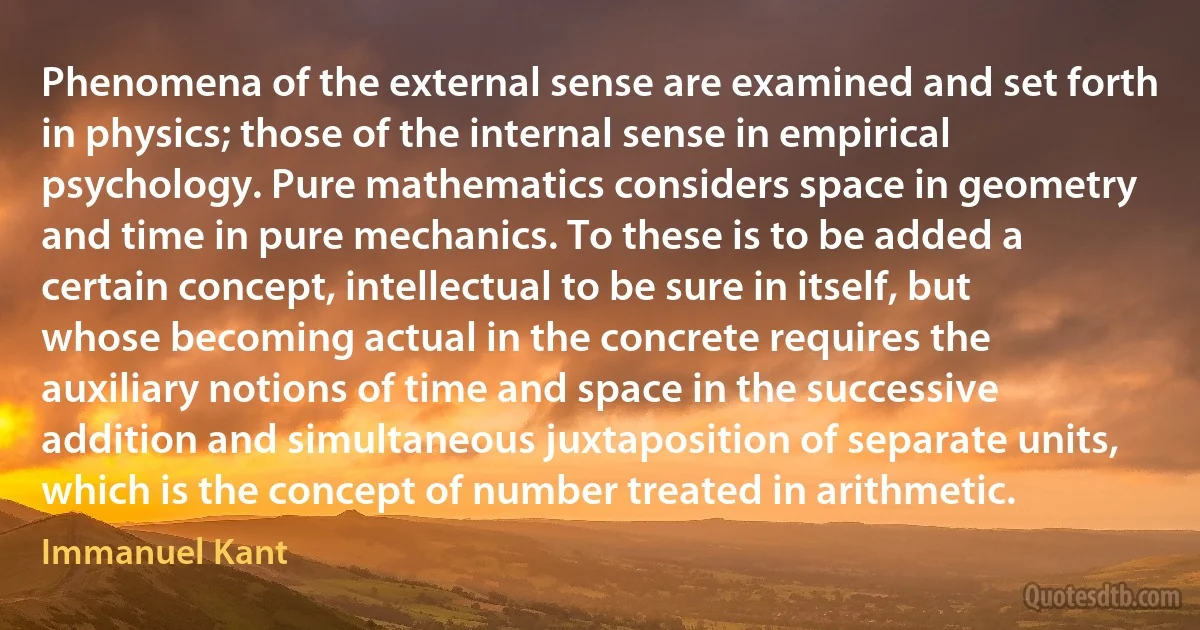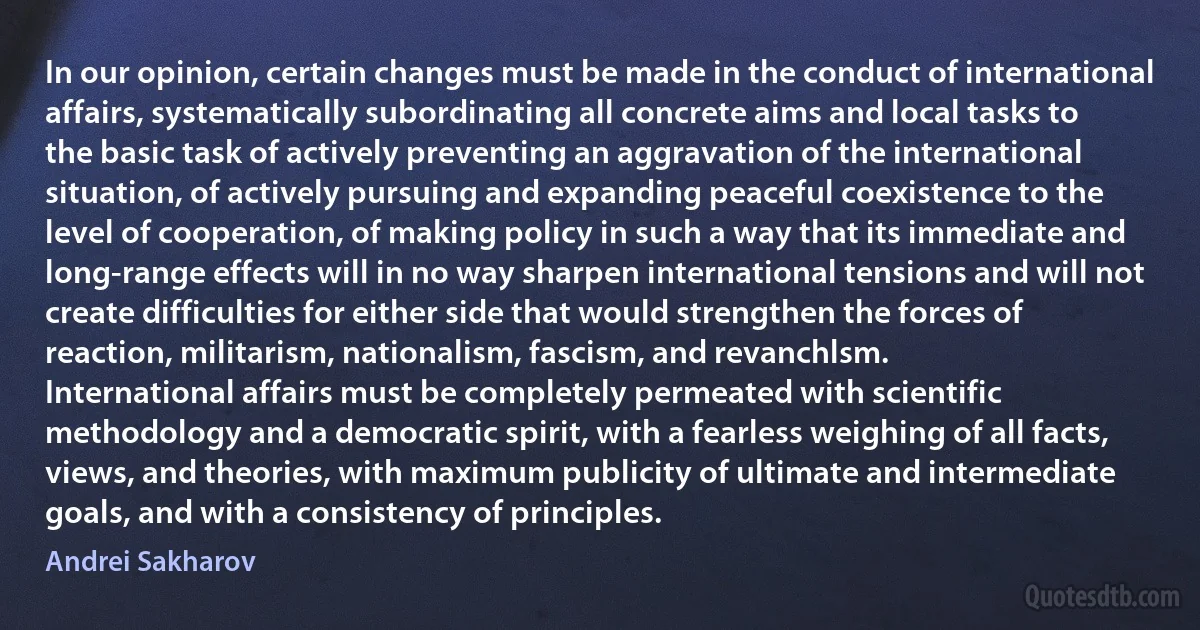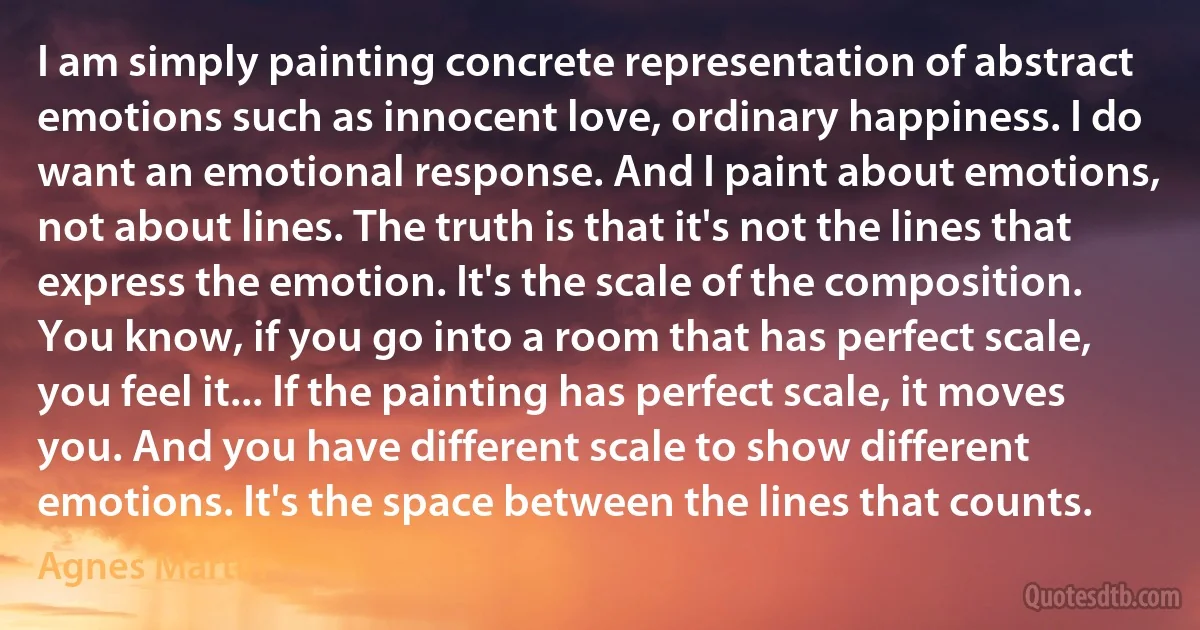Concrete Quotes - page 13
I have now reached a stage in the argument where I have to choose between being too definite or being too vague. If I set forth a concrete proposal in all its particulars, I expose myself to a hundred criticisms on points not essential to the principle of the plan. If I go further in the use of figures for illustration, I am involved more and more in guess-work; and I run the risk of getting the reader bogged in details which may be inaccurate and could certainly be amended without injury to the main fabric. Yet if I restrict myself to generalities, I do not give the reader enough to bite on; and am in fact shirking the issue, since the size, the order of magnitude, of the factors involved is not an irrelevant detail.

John Maynard Keynes
A man who belongs to some communist or revolutionary society wills certain concrete ends, which imply the will to freedom, and that freedom is willed in community. We will freedom for freedom's sake, and in and through the particular circumstances. And in thus willing freedom, we discover that it depends entirely upon the freedom of others and that the freedom of others depends upon our own.

Jean-Paul Sartre
The idea that in order to get clear about the meaning of a general term one had to find the common element in all its applications has shackled philosophical investigation; for it has not only led to no result, but also made the philosopher dismiss as irrelevant the concrete cases, which alone could have helped him understand the usage of the general term.

Ludwig Wittgenstein
Suppose you had the revolution you are talking and dreaming about. Suppose your side had won, and you had the kind of society you wanted. How would you live, you personally, in that society? Start living that way now! Whatever you would do then, do it now. When you run up against obstacles, people, or things that won't let you live that way, then begin to think about how to get over or around or under that obstacle, or how it push it out of the way, and your politics will be concrete and practical.

Paul Goodman
Rationalist politics, I have said, are the politics of the felt need, the felt need not qualified by a genuine, concrete knowledge of the permanent interests and direction of movement of a society, but interpreted by 'reason' and satisfied according to the technique of an ideology: they are the politics of the book.

Michael Oakeshott
...to replace, as far as possible, works in the concrete conditions wherein they were written, spiritual conditions in part, that is to say, philosophical, rhetorical or poetic tradition, material conditions in part, that is to say, scholarly and social milieu, constraints stemming from the material support of writing, historical circumstances. Every work must be replaced in the praxis from which it emanates.

Pierre Hadot
We may not be the center of the universe and the telos of evolution, but we are concrete embodiments of cosmic processes in their particular terrestrial variation. And, albeit accidentally, we did happen to evolve a most remarkable property: self -reflection. In virtue of this we may be among the very few species of natural systems in the universe which are able not only to sense the world and respond to it, but to know their own sensations and come to reasoned conclusions about the nature of the universe. To be a man is thus to have the almost unique opportunity of getting to know oneself and the world in which one lives. It is surely shortsighted to disregard this opportunity and confine oneself solely to the business of living. A failure to exploit our capability for rational knowledge is, moreover, contrary to the business of living.

Ervin László
With the advent of medieval Scholasticism, ... we find a clear distinction between theologia and philosophia. Theology became conscious of its autonomy qua supreme science, which philosophy was emptied of its spiritual exercises, which, from now on, were relegated to Christian mysticism and ethics. Reduced to the rank of a "handmaid of theology,” philosophy's role was henceforth to furnish theology with conceptual-and hence purely theoretical-material. When, in the modern age, philosophy regained its autonomy, it still retained many features inherited from this medieval conception. In particular, it maintained its purely theoretical character, which even evolved in the direction of a more and more thorough systemization. Not until Nietzsche, Bergson, and existentialism does philosophy consciously return to being a concrete attitude, a way of life and of seeing the world.

Pierre Hadot
There are really two things that drive New Year's resolution success. Number one is telling somebody about your goal. Chances are, they'll either join you in pursuing it or at least support you. Number two is to be concrete and specific. You don't want a goal like "becoming a better person," because there's no objective way to judge that. It's got to be something like "I'm going to call my mother once a week." Or "I'm going to cut my body mass index to 25." It can't be fudgeable.

Mehmet Oz
You feel a certain way in a glass or concrete or limestone building. It has an effect on your skin - the same with plywood or veneer, or solid timber. Wood doesn't steal energy from your body the way glass and concrete steal heat. When it's hot, a wood house feels cooler than a concrete one, and when it's cold, the other way around.

Peter Zumthor
I love the ocean, wide-open space and trees, but I'm not a gardener or anything like that. I think I may be, eventually. I was raised in the city, so I don't have that skill set, but my heart is more with the dirt than the concrete. It's an unrequited love with nature - a one-way love affair.

David Duchovny
The second level of legitimation contains theoretical propositions in a rudimentary form. Here may be found various explanatory schemes relating sets of objective meanings. These schemes are highly pragmatic, directly related to concrete actions. Proverbs, moral maxims and wise sayings are common on this level. Here, too, belong legends and folk tales, frequently transmitted in poetic forms.

Peter L. Berger
Military history, especially Russian, is being studied poorly. We have a lot of unfair ridiculing of the old army despite the fact that we had such notable tsarist army generals as Suvorov, Kutuzov and Bagration who will always remain in the minds of the people as great Russian military leaders and who are revered in the Red Army as a legacy of the finest military traditions of the Russian soldier. There exists a harmful cult of Civil War heroes, while previous Russian military achievements are ignored. All of this leads to the ignoring of concrete historical experience despite the fact that history is the best teacher.

Lev Mekhlis
Humanism does not exist in itself, just as man taken in himself and for himself does not exist. Only concrete man exists, man set in a particular age, living in a particular country, belonging to a particular social class, representing a particular tradition and particular personal ideals.

Adam Schaff
# General system theory in the narrower sense (G. S. T.), trying to derive from a general definition of "system” as complex of interacting components, concepts characteristic of organized wholes such as interaction, sum, mechanization, centralization, competition, finality, etc., and to apply them to concrete phenomena.
While systems theory in the broad sense has the character of a basic science, it has its correlate in applied science, sometimes subsumed under the general name of Systems Science.

Ludwig von Bertalanffy
A persuasive way of understanding the collapse of Communism in Europe and the Soviet Union is to think of nineteenth- or twentieth-century slum clearance. For in many respects the Soviet Empire was a slum of continental proportions. Beyond the grotesque architectural assertions of an alien ideology, public housing – almost all housing – consisted of anomic and primitive concrete barracks where the smells of cabbage, damp and low-grade tobacco combined. Rivers and lakes were polluted by chemicals, with the Pleisse river in East Germany alternately turning first red then yellow.

Michael Burleigh



